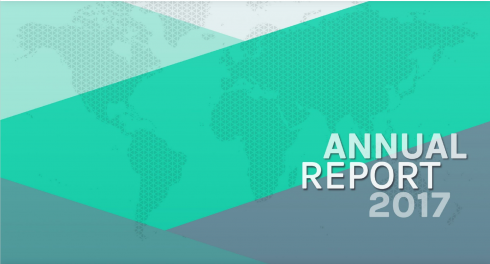In case you missed it…
Cyril Ramaphosa, South Africa’s new President, vows to “turn the tide” on corruption. “We should put behind us the era of diminishing trust in public institutions and weakened confidence in our country’s public leaders.” No easy task after his predecessor is accused of state capture and has been found by the country’s highest court to have misused public funds to refurbish his private residence. Yet new avenues might now open for good governance champions.
One topic for Ramaphosa’s attention is how to safeguard online protections for anti-corruption activists. Harassment is growing worldwide. In Russia, Instagram has submitted to government demands to block corruption claims made by the country’s most prominent opposition leader (YouTube so far, has refused to do so). Facebook, the owner of Instagram, admitted to censorship “when governments believe that something on the internet violates their laws” but also said they are transparent about content restrictions made for government requests in their Transparency Report. In 2017, Facebook has censored 156 posts in Russia. Perhaps bottom line impacts might force a rethink. Unilever is taking a stand against fake news and hateful language by threatening to pull out advertising from tech giants Facebook and Google unless they “clean up the swamp”.
Really want to make your point? Forget the digital space and dance. Offline anti-corruption messages took center stage at the Rio Carnival in Brazil. A samba school won the top prize with an anti-corruption message – a huge rat surrounded by politicians with gold briefcases taking charge of the country.
Media champions of good governance continue to be at risk. In Turkey, more than 150 writers and journalists have been placed behind bars since the 2016 coup. The United Nations and OSCE have condemned the most recent attack on six journalists. Such trends suggest we need stronger support for independent media (one topic of conversation at TAI’s retreat next week). This report (supported by our member Omidyar Network) suggests ways to do that in Kenya while the Engagement Lab highlight the potential of civic media to address the crisis of distrust.
Another emerging threat to civic space? Populism, specifically right-wing populism, according to Oxfam and academics interviewed by the London School of Economics. This also emerged during a roundtable discussion organized by Chatham House on our report last week, and during the ON Think Tank Conference 2018 in London. So how do you combat populism? Ben Okri pleads for active citizenship. What about in fragile contexts? A senior researcher from IDS talks about the challenges of working on social accountability in fragile, conflict and violent settings (see word cloud below) and new research explores the role of donors in empowerment and accountability initiatives in fragile contexts.

In last week’s issue, we featured B-Team’s responsible tax principles, which came up in a number of conversations among over 500 tax experts gathered at the UN last week to discuss Tax and the SDGs. Alex Cobham from the Tax Justice Network worries they don’t move the needle enough on transparency.
It is good to see Jim Brumby of the World Bank among those urging value of tax transparency to increase scrutiny and help tax authorities “go after the big money.” Insights from Uganda on taxing high net worth individuals are well-timed. However, it was clear that there are many competing priorities on countries as they look to ways to strengthen their tax systems to delivery on the SDGs, and the long-running debates on how to reform international tax rules rumble on.
The conversation around the Extractive Industries Transparency Initiative board meeting focused on claims of US oil firms gaming the initiative, but we shouldn’t lose sight of signs of action in implementing countries. For example, 8 of 11 recommendations of Papua New Guinea’s EITI reports 2013-16 have now been implemented. In the Democratic Republic of Congo, revisions of the mining code await the President’s signature, but mining companies are fiercely resistant. The new code would raise royalties on base metals, including cobalt. The Wall Street Journal details how China is increasingly dominating that trade and winning the race for battery production with mixed consequences in DRC.
More positively, French oil giant Total declared support for contract transparency – the first of the “supermajors” to do so, building on the leadership of smaller players, such as Kosmos Energy. Furthermore, the company is asking host states to disclose their petroleum contracts and licenses. Will this finally help break the logjam of big oil opposition?
What’s ahead for the Open Government Partnership in 2018? Open government plans, a Feminist Open Government project, a trust fund to support local implementation, and a global summit in Georgia (should keep co-chair Canada happy).
We anticipate more big and open data sets. The ODI launched a new project aiding organizations to create open data standards towards adoption and wider impact. But the International Journalists’ Network states – big data is for machines and we need to learn how to use small data sets for impactful stories. In the case of the Panama Papers, the total amount of data leaked was around 2.6 terabytes (TB). However, only 22 megabytes (MB) made it to the final ICIJ database.
Turning back to big data, it seems most of the hardest AI challenges “aren’t technological at all.” Yonatan Zunger, an ex-Google employee, explains how to ask the right questions about AI. It’s a long read from last year, but we highly recommend it. Meanwhile, the Polish Ministry of Justice refuses to release algorithm used for allocating judges to cases. Says sources codes not public information. How do we clarify good practice across countries and shape a norm for transparency of automated decision making?
Our numbers of the week? 153 and 43. The yes and no votes respectively that passed Morocco’s Access to Information bill that now goes to King and Prime Minister for signature and should be operational within a year.
We have featured participatory grantmaking and the $100 million single grant. What about a no-strings-attached grant? This is what Dropbox, a new player in philanthropy, is set out to do. What about organizing within the donor community? Surdna Foundation and the Andrus Family Fund pledged grants to foster a progressive tilt among the next-generation of philanthropists. What are the development sector’s most burning questions? See results from 360Giving below.

Finally, returning to the trust theme – how worried should we be by declining public trust in the development sector itself? Oxfam’s sex abuse scandal adds another blow and is prompting closer scrutiny of the wider aid sector, with British politicians demanding for a sector-wide investigation. Save the Children even ask if we need to create a global watchdog. Devex summarizes what the Oxfam incident means to the industry and some proposed measures that organizations can implement.
TAI spotlight
- How to Learn From The Future | Omidyar Network – Omidyar Network invests in monitoring trends and developing foresight to be better investors and partners.
- Renewing Our Commitment To The Cyber Initiative | William + Flora Hewlett Foundation – Larry Kramer explains why Hewlett Foundation is investing in cyber policy
- The Murder of Temistocles Machado: Human Rights Defenders In Colombia Are Still Under Threat | Ford Foundation – In 2017, one out of three activists killed globally, were killed in Colombia. Javier Ciurlizza shares insights on why protecting civil society remains an uphill battle.
- How We Practice Effective Philanthropy: Resources and Guides From The Hewlett Foundation | William + Flora Hewlett Foundation – Hewlett Foundation shares helpful resources that guide their evaluation

Of potential interest….
- When The Fox Guards The Hen House – A former Oxfam America employee reflects on what’s wrong with the sector and steps that could be taken by the organization
- Adaptive Learning? Liberia Can Teach The World A Thing Or Two! – What did Accountability Lab Liberia and iLab Liberia’s learning mapping reveal about the country’s development community?
- Plan B For Development – Podcast with World Bank Group President Jim Yong Kim – Jim Kim on blockchain, robots, multilateralism and development finance
- S. Oil Majors Must End Transparency Hypocrisy – The National Resource Governance Institute calls for transparency of oil giants ExxonMobil and Chevron
- Iceland Will Use More Energy Mining Bitcoin Than Powering The Country – Iceland’s data centers for bitcoin may use more energy than all of the country’s homes
- The Trump White House has more power to constrain bad guys – The Economist catches up on a story TAI Weekly featured a while back on new powers adopted by the US administration that offer a big stick against human rights violators.
Calls
- Building Resilient Roots – call for pilot projects to explore factors to increase public support and trust in CSOs coordinated by Accountable Now
- Gender Data Impact: Call for Stories – March 8
- Join the OGP Local Program: Call for Expressions of Interest – March 9
- ICFJ Knight Fellow, Data Journalism, Central/Eastern Europe
Calendar
- The debate about RCTs in development is over. We won. They lost. – February 21 (New York, USA)
- Conference on Fairness, Accountability and Transparency (in tech systems)– February 23-24 (New York, USA)
- Open Data Day 2018 – March 3 (Global)
- Innovations in Participatory Democracy Conference – March 8-10 (Phoenix, Arizona, USA)
- Toward Greater Impact: Building Stronger Funder-Nonprofit Relationships – March 20 (California, USA)
- Data for Development Festival – March 21-23 (Bristol, UK)
- Collective Impact Convening– April 3-5, 2018 (Austin, TX)
- A Return to ‘Governance in Dark Times’? Creating Spaces for Citizen Dialogue, Encouraging Engagement in Public Life, and Ensuring Government Transparency and Accountability – April 12-14 (Orlando, Florida, USA)
- TicTec 2018: The Impacts of Civic Technology Conference– April 18-19 (Lisbon, Portugal)
- Grantmakers for Effective Organizations National Conference – April 30 – May 2, 2018 (San Francisco, CA)
- RightsCon (human rights in the digital age) – May 16 – 18 (Toronto, Canada)
- OGP Global Summit 2018 – July 17- July 19 (Tbilisi, Georgia)
- The Future is Open: 5th International Open Data Conference – September 20-21, Buenos Aires


